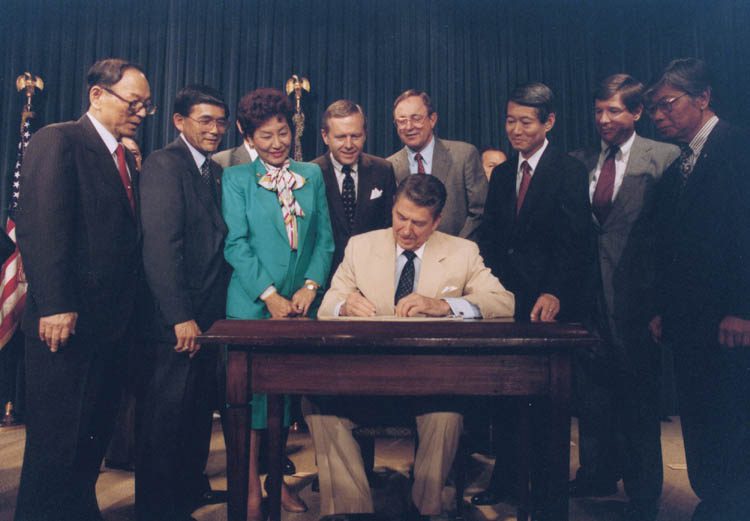
FROM WIKIPEDIA COMMONS
The Civil Liberties Act of 1988 (Pub.L. 100–383, title I, August 10, 1988, 102 Stat. 904, 50a U.S.C. § 1989b et seq.) is a United States federal law that granted reparations to Japanese Americans who had been interned by the United States government during World War II. The act was sponsored by California Democratic congressman and former internee Norman Mineta, Wyoming Republican senator Alan K. Simpson (who had met Mineta while visiting an internment camp) and California senator Pete Wilson. The bill was supported by the majority of Democrats in Congress, while the majority of Republicans voted against it. The act was signed into law by President Ronald Reagan.
The act granted each surviving internee $20,000 in compensation, equivalent to $39,000 in 2020, with payments beginning in 1990. The legislation stated that government actions had been based on “race prejudice, war hysteria, and a failure of political leadership” as opposed to legitimate security reasons. A total of 82,219 received redress checks.
Because the law was restricted to American citizens and legal permanent residents, ethnic Japanese who had been taken from their homes in Latin America (mostly from Peru) were not granted reparations, regardless of whether they had remained in the United States, had returned to Latin America or had been deported to Japan after the war. In 1996, Carmen Mochizuki filed a class-action lawsuit and won a settlement of approximately $5,000 per eligible person. Of those affected, 145 received their settlement before funds were exhausted. In 1999, funds were approved for the Attorney General to pay compensation to the remaining claimants.
TODAY’S ALMANAC
St. Lawrence’s Day
When told by Roman officials to surrender the church’s valuables, St. Lawrence brought the city’s poor and sick. “Here is the church’s treasure,” he said. Rome didn’t find this amusing, and legend says he was put to death in A.D. 258 by being roasted on a grate, although some scholars say he was more likely beheaded. In either case, folks in southern Europe still mark this day. It is customary there to eat only cold meat in recognition of the reputed manner of his death. Fair weather on St. Lawrence’s Day presages a fair autumn.
Question of the Day
How long is the solar cycle?
The solar cycle is the periodic change in the number of sunspots. (Sunspots are a big factor in The Old Farmer’s Almanac annual weather forecasts.) The cycle is the interval between successive minima (periods of low sunspot activity) and is about 11.1 years. During the cycle, solar flares, sunspots, and other magnetic phenomena move from intense activity to relative calm and back again.
Advice of the Day
Place violets in your bedroom to help you sleep.
Home Hint of the Day
To repoint a chimney, scrape out all the loose mortar from the outside of the joints. Then mix up masonry cement by combining 3 parts sand, 1 part cement, and enough water to make it workable. Apply this new mortar to the joints with a trowel.
Word of the Day
Relative humidity
The amount of moisture in the air compared to the maximum amount of moisture the air could hold at a given temperature; measured as a precentage of saturation.
Puzzle of the Day
The Natural State. (Name the U.S. state!)
Arkansas
Born
- James Wilson Morrice (artist) – 1865
- Herbert Hoover (31st U.S. president) – 1874
- Wolfgang Paul (physicist) – 1913
- Jimmy Dean (actor, singer, & businessman) – 1928
- Bobby Hatfield (one of the Righteous Brothers) – 1940
- Betsy Johnson (designer) – 1942
- Ian Anderson (musician) – 1947
- Rosanna Arquette (actress) – 1959
- Antonio Banderas (actor) – 1960
- Angie Harmon (actress) – 1972
Died
- Otto Lilienthal (German aviator whose work made a significant contribution to the success of the Wright Brothers) – 1896
- Robert Goddard (rocket scientist) – 1945
- Isaac Hayes (singer & songwriter) – 2008
Events
- Missouri, the second state to be created from the Louisiana Purchase, was admitted to the Union as the 24th state– 1821
- The Smithsonian Institution was established at the bequest of James Smithson; the reason for the bequest remains unknown– 1846
- Alexander Graham Bell received the first long-distance phone call in Brantford, Ontario, from his father who was 8 miles away in Paris, Ontario– 1876
- The Canadian Bill of Rights was enacted– 1960
- President Ronald Reagan signed the Civil Liberties Act of 1988– 1988
- Judge Ruth Bader Ginsburg was sworn in as the 107th justice of the US Supreme Court– 1993
- First Earth/Space wedding. Russian cosmonaut Yuri Malenchenko, aboard the International Space Station (ISS), married Ekaterina Dmitriev, on Earth– 2003
- For the first time in Canada, a court ordered a man to give his ex-wife monthly support payments for their dog. The man was told to pay $200 a month in alimony towards the upkeep of the couples’ St. Bernard– 2004
Weather
- A tornado hit Coney Island, New York, causing extensive damage– 1878
- Frost was reported in Iowa and Chicago– 1882
- 101.3 degrees F in Kent, England– 2003
- -136 degrees F (-93.2 degrees C) recorded at the East Antarctic Plateau in Antarctica, making it the coldest temperature on Earth on record at the time– 2010
COURTESY www.almanac.com

You should take part in a contest for one of the best blogs on the web. I will recommend this site!